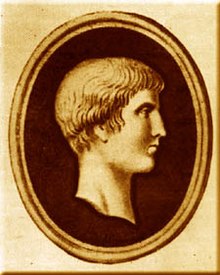Martialis
| Martial | |
|---|---|
 |
|
| Born | March, between 38 and 41 AD Augusta Bilbilis (now Calatayud, Spain) |
| Died | Between 102 and 104 AD Rome |
| Occupation | Author |
| Nationality | Roman |
| Genre | Satire |
| Notable works | Epigrams |
Marcus Valerius Martialis (known in English as Martial /ˈmɑːrʃəl/) (March, between 38 and 41 AD – between 102 and 104 AD) was a Roman poet from Hispania (modern Spain) best known for his twelve books of Epigrams, published in Rome between AD 86 and 103, during the reigns of the emperors Domitian, Nerva and Trajan. In these short, witty poems he cheerfully satirises city life and the scandalous activities of his acquaintances, and romanticises his provincial upbringing. He wrote a total of 1,561, of which 1,235 are in elegiac couplets.
Martial has been called the greatest Latin epigrammatist, and is considered the creator of the modern epigram.
Knowledge of his origins and early life are derived almost entirely from his works, which can be more or less dated according to the well-known events to which they refer. In Book X of his Epigrams, composed between 95 and 98, he mentions celebrating his fifty-seventh birthday; hence he was born during March 38, 39, 40 or 41 AD (x. 24, 1), under Caligula or Claudius. His place of birth was Augusta Bilbilis (now Calatayud) in Hispania Tarraconensis. His parents, Fronto and Flaccilla, appear to have died in his youth.
His name seems to imply that he was born a Roman citizen, but he speaks of himself as "sprung from the Celts and Iberians, and a countryman of the Tagus"; and, in contrasting his own masculine appearance with that of an effeminate Greek, he draws particular attention to "his stiff Hispanian hair" (x. 65, 7).
...
Wikipedia
